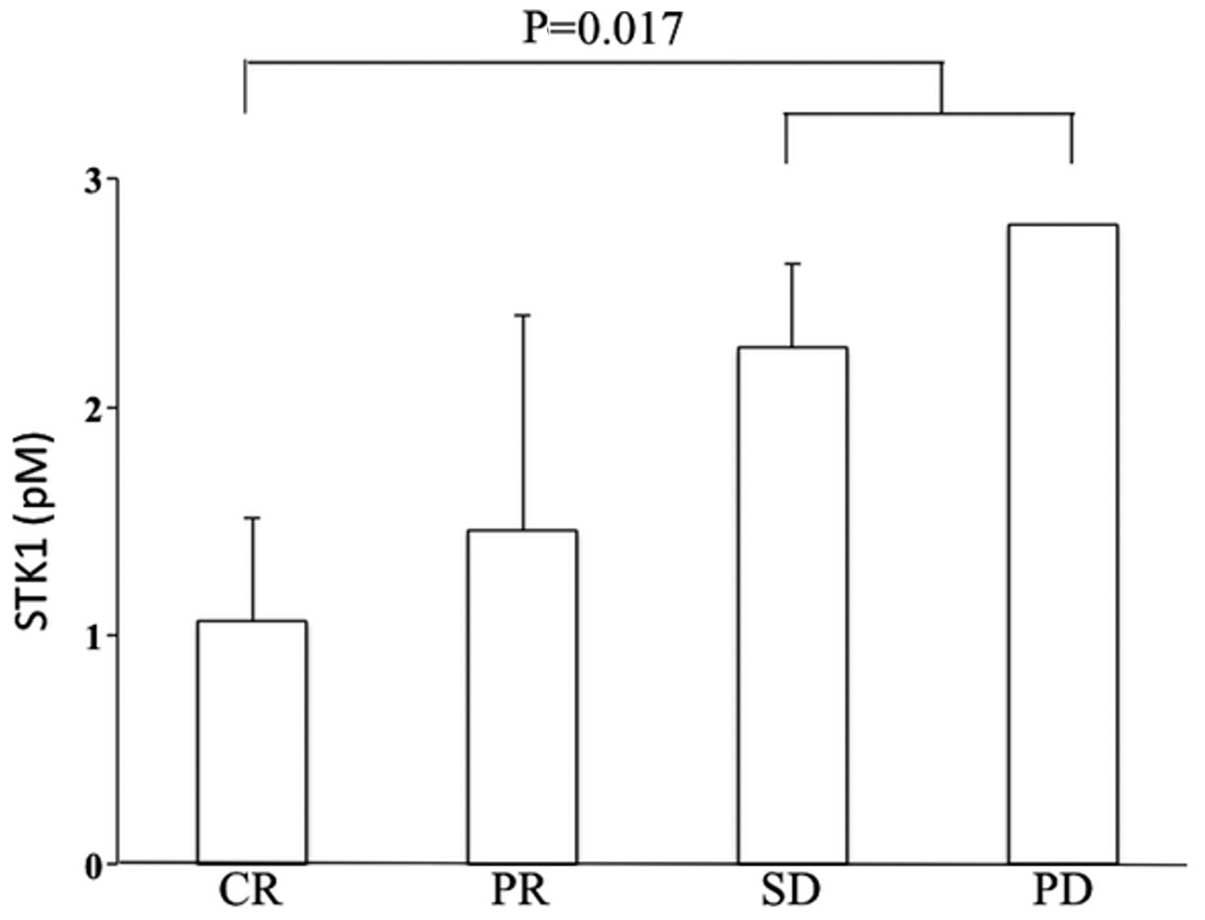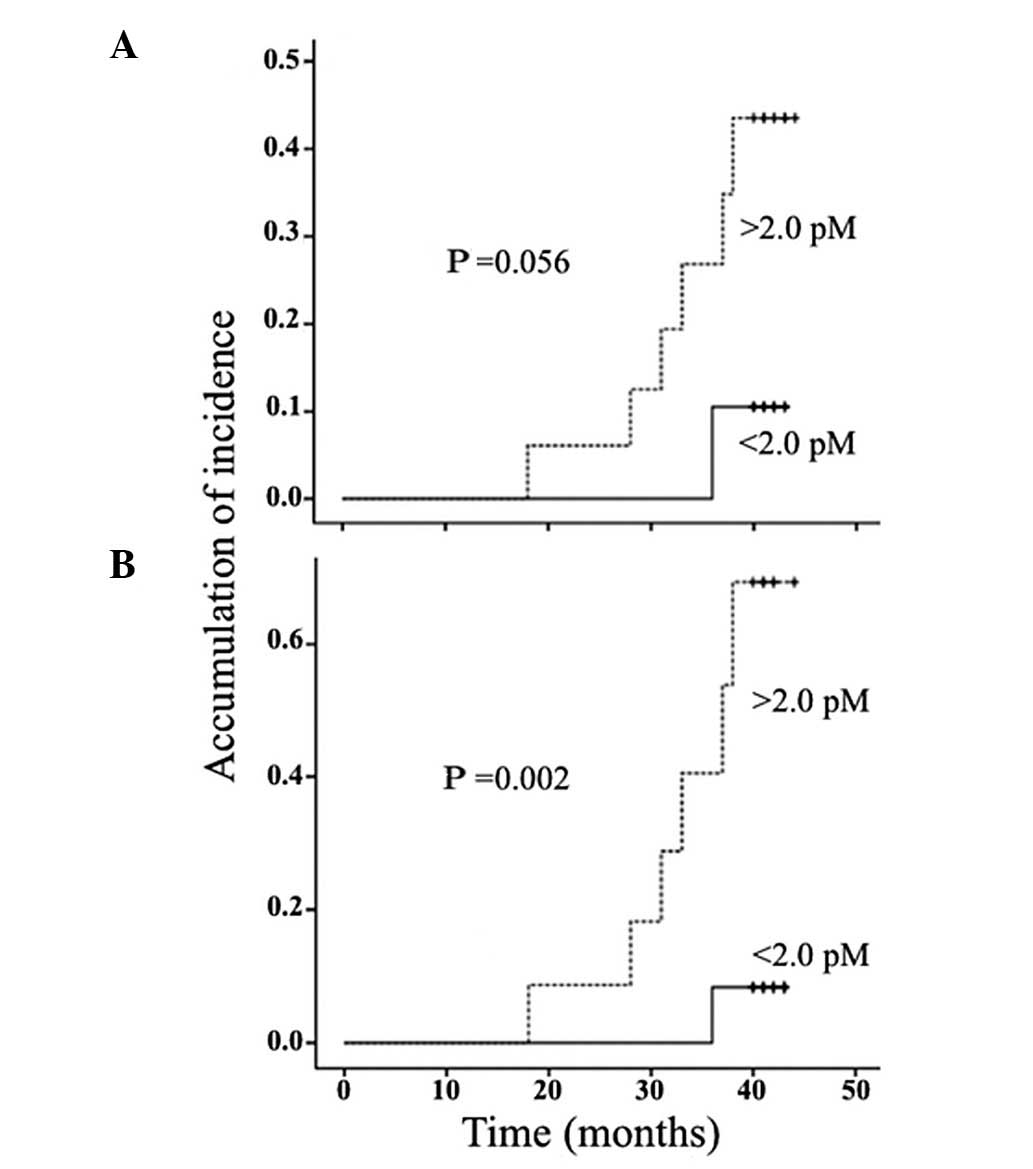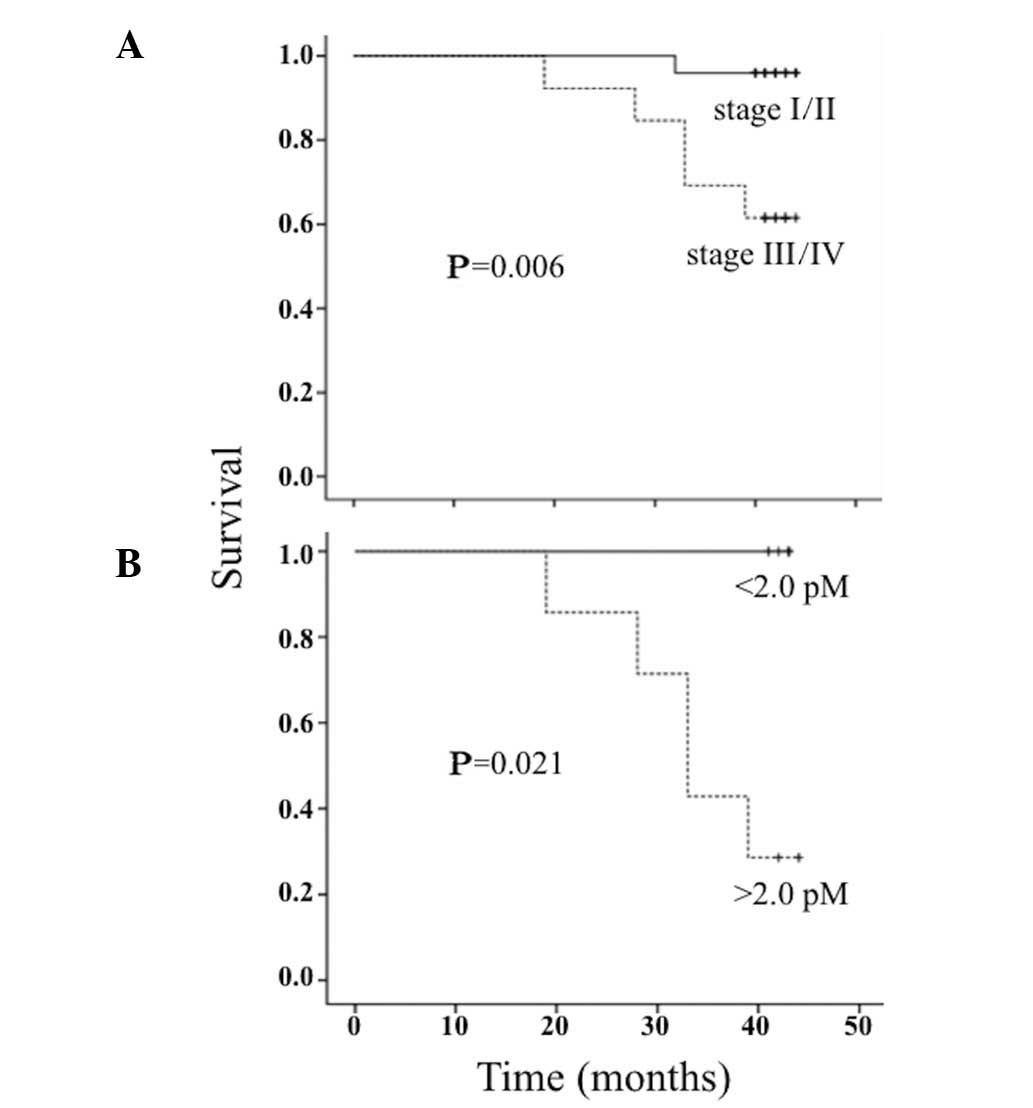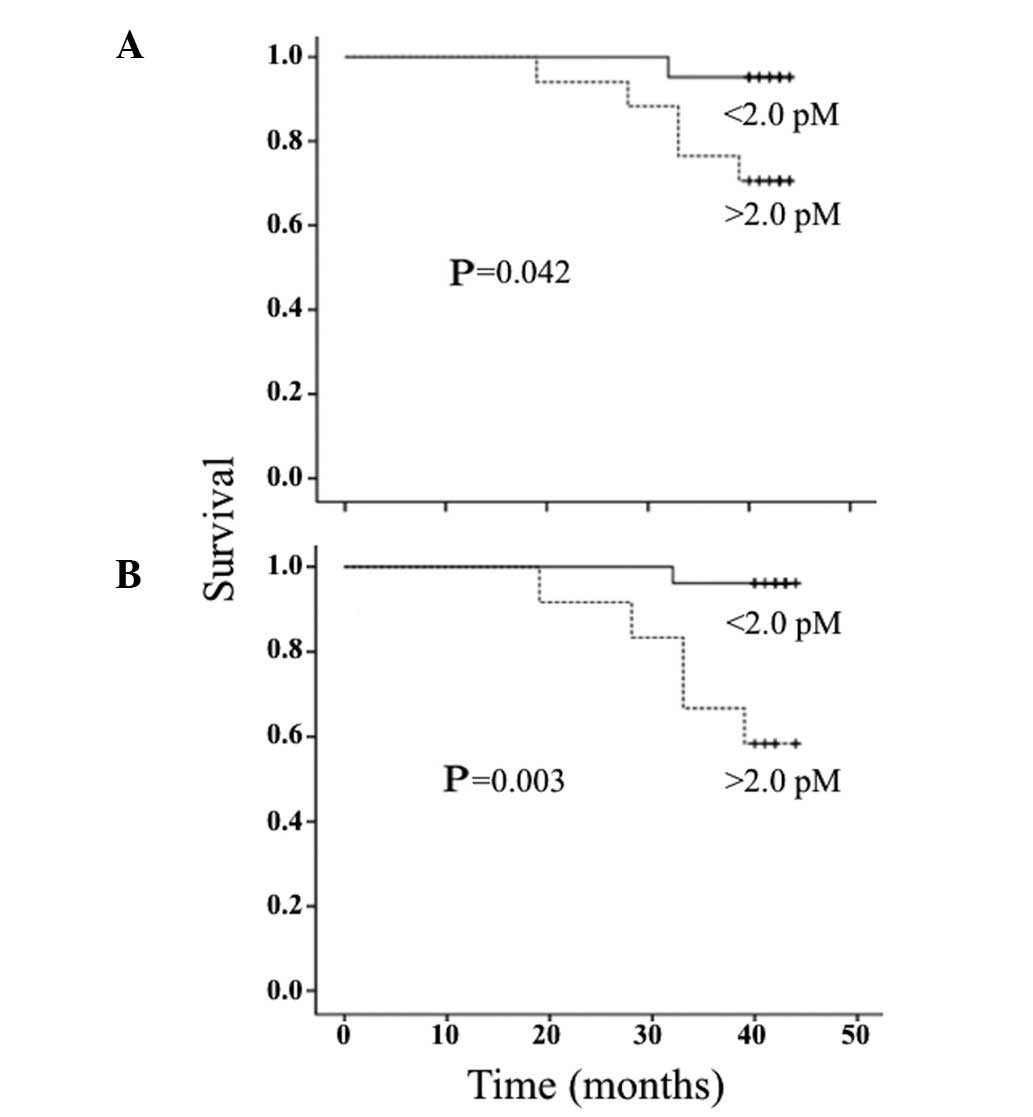|
1
|
Fisher B, Bryant J, Wolmark N, et al:
Effect of preoperative chemotherapy on the outcome of women with
operable breast cancer. J Clin Oncol. 16:2672–2685. 1998.PubMed/NCBI
|
|
2
|
Scholl SM, Pierga JY, Asselain B, et al:
Breast tumor response to primary chemotherapy predicts local and
distant control as well as survival. Eur J Cancer. 31A:1969–1975.
1995. View Article : Google Scholar : PubMed/NCBI
|
|
3
|
Semiglazov VF, Topuzov EE, Bavli JL, et
al: Primary (neoadjuvant) chemotherapy and radiotherapy compared
with primary radiotherapy alone in stage IIb–IIIa breast cancer.
Ann Ocol. 5:591–595. 1994.
|
|
4
|
Makris A, Powles TJ, Dowsett M, et al:
Prediction of response to neoadjuvant chemoendocrine therapy in
primary breast carcinomas. Clin Cancer Res. 3:593–600.
1997.PubMed/NCBI
|
|
5
|
Mauriac L, MacGrogan G, Avril A, et al:
Neoadjuvant chemotherapy for operable breast carcinoma larger than
3 cm: a unicentre randomized trial with a 124-month median
follow-up. Institute Bergonié Bordeaux Groupe Sein (IBBGS). Ann
Oncol. 10:47–52. 1999. View Article : Google Scholar : PubMed/NCBI
|
|
6
|
van der Hage JA, van de Velde CJ, Julien
JP, et al: Preoperative chemotherapy in primary operable breast
cancer: results from the European Organization for Research and
Treatment of Cancer trial 10902. J Clin Oncol. 19:4224–4237.
2001.
|
|
7
|
Fisher B, Gunduz N and Saffer EA:
Influence of the interval between primary tumor removal and
chemotherapy on kinetics and growth of metastases. Cancer Res.
43:1488–1492. 1983.PubMed/NCBI
|
|
8
|
Zhou J, He E and Skog S: The proliferation
marker thymidine kinase 1 in clinical use (Review). Mol Clin Oncol.
1:18–28. 2013.
|
|
9
|
Sherley JL and Kelly TJ: Regulation of
human thymidine kinase during the cell cycle. J Biol Chem.
263:8350–8358. 1988.PubMed/NCBI
|
|
10
|
Gasparri F, Wang N, Skog S, Galvani A and
Eriksson S: Thymidine kinase 1 expression defines an activated G1
stage of the cell cycle as revealed with site-specific antibodies
and ArrayScan assays. Eur J Cell Biol. 88:779–785. 2009. View Article : Google Scholar : PubMed/NCBI
|
|
11
|
NCCN Clinical Practice Guidelines in
Oncology™. Breast Cancer V.2.2007. Available at: http://www.nccn.org.
Accessed May 15, 2007
|
|
12
|
Goldstraw P and Groome P: Lung.
International Union Against Cancer (UICC). TNM Classification of
Malignant Tumours. Sobin LH, Gospodarowicz MK and Wittekind CH: 7th
edition. Wiley-Blackwell; New York, NY: pp. 138–146. 2009
|
|
13
|
Wu C, Yang R, Zhou J, et al: Production
and characterisation of a novel chicken IgY antibody raised against
C-terminal peptide from human thymidine kinase 1. J Immunol
Methods. 277:157–169. 2003. View Article : Google Scholar : PubMed/NCBI
|
|
14
|
He E, Xu XH, Guan H, et al: Thymidine
kinase 1 is a potential marker for prognosis and monitoring the
response to treatment of patients with breast, lung and esophageal
cancer and non-Hodgkin’s lymphoma. Nucleosides Nucleotides Nucleic
Acids. 29:352–358. 2010.PubMed/NCBI
|
|
15
|
Coskun U, Yamac D, Gulbahar O, et al:
Locally advanced breast carcinoma treated with neoadjuvant
chemotherapy: are the changes in serum levels of YKL-40, MMP-2 and
MMP-9 correlated with tumor response? Neoplasma. 54:348–352.
2007.PubMed/NCBI
|
|
16
|
Martinez-Trufero J, de Lobera AR, Lao J,
et al: Serum markers and prognosis in locally advanced breast
cancer. Tumori. 91:522–530. 2005.PubMed/NCBI
|
|
17
|
Kinsella MD, Nassar A, Siddiqui MT and
Cohen C: Estrogen receptor (ER), progesterone receptor (PR), and
HER2 expression pre- and post- neoadjuvant chemotherapy in primary
breast carcinoma: a single institutional experience. Int J Clin Exp
Pathol. 5:530–536. 2012.
|
|
18
|
Lee JS, Son BH and Ahn SH: The predictive
value of serum HER2/neu for response to anthracycline-based and
trastuzumab-based neoadjuvant chemotherapy. J Breast Cancer.
15:189–196. 2012. View Article : Google Scholar : PubMed/NCBI
|
|
19
|
Mazouni C, Hall A, Broglio K, et al:
Kinetics of serum HER-2/neu changes in patients with HER-2-positive
primary breast cancer after initiation of primary chemotherapy.
Cancer. 109:496–501. 2007. View Article : Google Scholar : PubMed/NCBI
|
|
20
|
Leyland-Jones B and Smith BR: Serum HER2
testing in patients with HER2-positive breast cancer: the death
knell tolls. Lancet Oncol. 12:286–295. 2011. View Article : Google Scholar : PubMed/NCBI
|
|
21
|
Holm NT, Byrnes K, Li BD, et al: Elevated
levels of chemokine receptor CXCR4 in HER-2 negative breast cancer
specimens predict recurrence. J Surg Res. 141:53–59. 2007.
View Article : Google Scholar : PubMed/NCBI
|
|
22
|
Chen F and Tang L: Significance of S-TK1
detecting in breast cancer patients and its relationship with
prognosis. Can Res Prev Treat. 39:637–641. 2012.(In Chinese).
|
|
23
|
Liedtke C, Mazouni C, Hess KR, et al:
Response to neoadjuvant therapy and long-term survival with
triple-negative breast cancer. J Clin Oncol. 26:1275–1281. 2008.
View Article : Google Scholar : PubMed/NCBI
|
|
24
|
Onitilo AA, Engel JM, Greenlee RT and
Mukesh BN: Breast cancer subtypes based on ER/PR and Her2
expression: comparison of clinicopathologic features and survival.
Clin Med Res. 7:4–13. 2009. View Article : Google Scholar : PubMed/NCBI
|
|
25
|
Verma S, Provencher L and Dent R: Emerging
trends in the treatment of triple-negative breast cancer in Canada:
a survey. Curr Oncol. 18:180–190. 2011. View Article : Google Scholar : PubMed/NCBI
|
|
26
|
Pinhel I, Hills M, Drury S, et al: ER and
HER2 expression are positively correlated in HER2
non-overexpressing breast cancer. Breast Cancer Res. 14:R462012.
View Article : Google Scholar : PubMed/NCBI
|
|
27
|
He Q, Fornander T, Johansson H, et al:
Thymidine kinase 1 in serum predicts increased risk of distant or
loco-regional recurrence following surgery in patients with early
breast cancer. Anticancer Res. 26:4753–4759. 2006.PubMed/NCBI
|
|
28
|
Xu Y, Shi QL, Ma H, et al: High thymidine
kinase 1 (TK1) expression is a predictor of poor survival in
patients with pT1 of lung adenocarcinoma. Tumour Biol. 33:475–483.
2012. View Article : Google Scholar : PubMed/NCBI
|
|
29
|
Chen G, He C, Li L, et al: Nuclear TK1
expression is an independent prognostic factor for survival in
pre-malignant and malignant lesions of the cervix. BMC Cancer.
13:249–258. 2013. View Article : Google Scholar : PubMed/NCBI
|
|
30
|
Nisman B, Allweis T, Kadouri L, et al:
Comparison of diagnostic and prognostic performance of two assays
measuring thymidine kinase 1 activity in serum of breast cancer
patients. Clin Chem Lab Med. 51:439–447. 2013. View Article : Google Scholar : PubMed/NCBI
|
|
31
|
He Q, Zou L, Zhang PA, et al: The clinical
significance of thymidine kinase 1 measurement in serum of breast
cancer patients using anti-TK1 antibody. Int J Biol Markers.
15:139–146. 2000.PubMed/NCBI
|
|
32
|
Chen ZH, Huang SQ, Wang Y, et al:
Serological thymidine kinase 1 is a biomarker for early detection
of tumours - a health screening study on 35,365 people, using a
sensitive chemiluminescent dot blot assay. Sensors (Basel).
11:11064–11080. 2011. View Article : Google Scholar : PubMed/NCBI
|



















